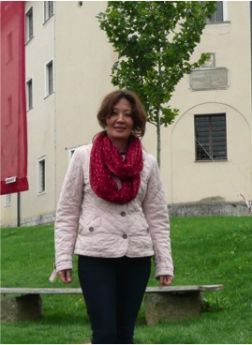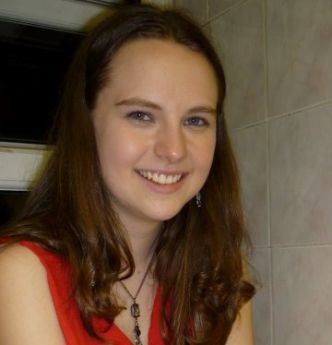2013
During 2013, the Association supported Dr Elena Pavlova and Dr Katherine Aitchison to attend meetings throughout Europe. Here are their reports:
 Dr Elen Pavlova writes I am a MD/PhD graduate and a research fellow in the Department of Medicine at the University of Cambridge, where I have been studying Gaucher disease with Professor Cox for several years.
Dr Elen Pavlova writes I am a MD/PhD graduate and a research fellow in the Department of Medicine at the University of Cambridge, where I have been studying Gaucher disease with Professor Cox for several years.
I started my research and clinical work in Gaucher disease in the Moscow Research Centre for Children's Health where together with Russian colleagues we looked after children with Gaucher disease. I was fortunate to meet Susan Lewis and other members of the Gauchers Association to whom I am grateful for their gracious support of my research at Cambridge.
My present study focuses on studying hematological cancers in Gaucher disease. This study aims to understand why fatal lymphoma and myeloma complicate Gaucher disease. It promises to reveal more about the general mechanisms of lymphoma.
Many thanks for the award. I particpated in the Graduate Course 'Lysosomes and Lysosomal Diseases' which was held for graduate students and postdoctoral scientists. The course was a part of the 19th European Study Group on Lysosomal Diseases Workshop. The agenda was extremely fascinating and covered various aspects of lysosomal diseases. It was a great opportunity to hear the most recent findings and new directions in the LSD field.
It is fascinating how research into LSDs may contribute to our better understanding of fundamental biological processes and many other pathological conditions suggesting new prosective studies for research. This was a special experience for me and a wonderful chance to meet researchers with overlapping interests.
I am grateful to the Gauchers Association for granting me the Susan Lewis Memorial Award to support my attendance at this magnificant international meeting.
 Dr Katherine Aitchison reports on the European Society of Gene and Cell Therapy Conference I am a PhD student at the University College London Institute of Child Health and for the last three years I have been working on developing gene therapy for the treatment of Type I Gaucher disease. Gene therapy works in the same way as bone marrow transplants but instead of using cells from a second person, the transplant consists of the patient's own cells which have been genetically corrected so that they contain a healthy copy of the glucocerebrosidase gene. This reduces the risk that the transplanted cells will be rejected or cause graft-versus-host diseases, as can happen with standard bond marrow transplantation. The genetic correction would be permanent as we would target the stem cells which are the foundation of the blood system and all cells which develp from these stem cells will carry the functional gene.
Dr Katherine Aitchison reports on the European Society of Gene and Cell Therapy Conference I am a PhD student at the University College London Institute of Child Health and for the last three years I have been working on developing gene therapy for the treatment of Type I Gaucher disease. Gene therapy works in the same way as bone marrow transplants but instead of using cells from a second person, the transplant consists of the patient's own cells which have been genetically corrected so that they contain a healthy copy of the glucocerebrosidase gene. This reduces the risk that the transplanted cells will be rejected or cause graft-versus-host diseases, as can happen with standard bond marrow transplantation. The genetic correction would be permanent as we would target the stem cells which are the foundation of the blood system and all cells which develp from these stem cells will carry the functional gene.
This year I was lucky enough to obtain a grant from the Susan Lewis Memorial Fund which allowed me to travel to Madrid for the annual European Society of Gene and Cell Therapy (ESGCT) meeting attended by almost a thousand scientists and clinicians. Over the four days I attended talks by some of the world leaders in the field of gene therapy and I heard some very encouraging data regarding clinical trials and pre-clinical work which demonstrated how far the field has come in the last few years.
I was chosen to present a poster at the conference in order to communicate the work that I am involved with and I was fortunate enough to speak to members of other groups also working on gene therapy for Gaucher disease. This allowed me to see the strategies they are employing, discuss their progress and try to find solutions to problems common between the groups. In addition to Gaucher disease, several presentations focused on gene therapy for other lysosomal storage disorders (LSDs) and because of the similarities between many of the LSDs it is possible to apply what they have learnt from their work to my own project and thereby develop my own work. It was also very interesting to get an idea of the wider gene and cell therapy field and see some incredibly innovative technologies being developed around the world and the novel methods for treating diseases which are being investigated. It's a very exciting time to be working in the field of gene therapy an seeing the promise of targeted treatment become a reality with many successful clinical trials.
I would like to thank the trustees of the Susan Lewis Memorial Fund for giving me the chance to attend this meeting and benefit from hearing the many impressive speakers.
